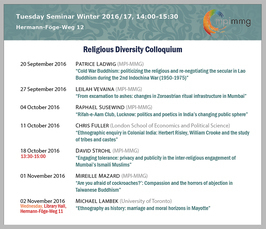"What Gura Killed: Wildmen, White Men, and the Beastly Excess to Differences That Matter"
Religious Diversity Colloquium Winter 2016/17
- Date: Nov 23, 2016
- Time: 02:00 PM - 03:30 PM (Local Time Germany)
- Speaker: Nils Bubandt (Aarhus University)
- Nils Bubandt is Professor of Anthropology at Aarhus University, where he (with Anna Tsing) co-directs AURA (Aarhus University Research on the Anthropocene). With Mark Graham, he is also editor-in-chief of Ethnos. Recent and forthcoming publications include The Empty Seashell: Witchcraft and Doubt on an Indonesian Island (Cornell University Press, 2014); Democracy, Corruption and the Politics of Spirits in Contemporary Indonesia (Routledge 2014); and Arts of Living on a Damaged Planet (co-edited with Anna Tsing, Heather Swanson and Elaine Gan)(University of Minnesota Press, 2017).
- Location: MPI-MMG, Hermann-Föge-Weg 11, Göttingen
- Room: Library Hall

For more details please contact vdvoffice(at)mmg.mpg.de.
On the Indonesian island of Halmahera people claim that the hairy and barely human figures that are rumoured to roam the forests are sixteenth century Portuguese colonizers. These white wildmen collapse orientalist images of ‘the wild man’ with occidentalist ideas of the ‘white man’ in instructive ways. Linking the Halmaheran wildman to other wildmen in eastern Indonesia that have captured the world’s attention in recent years I suggest that the white wildman is a supplement — a body of excess in local, national and global spaces of imagination, desire and political reform — that both cross-fertilizes and unsettles the orders into which he is recruited. The white wildman essentially refuses to respect the boundaries that he is implicated in maintaining: the boundaries between past and present, between tradition and modernity, between myth and science, between cultural imagination and political reality. The paper concludes that these wild-yet-Western creatures may help us understand how power works, also and especially in a globally mediated world.